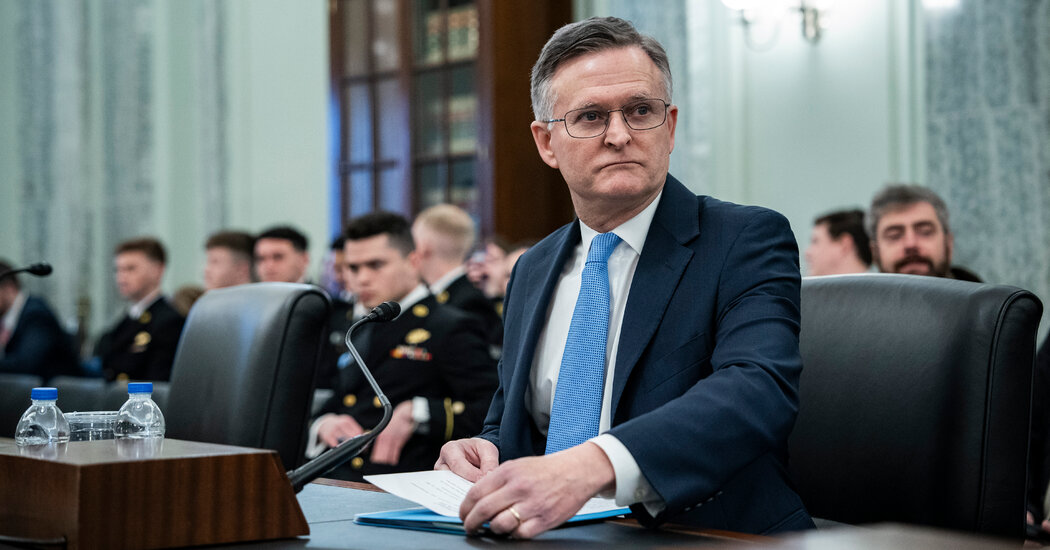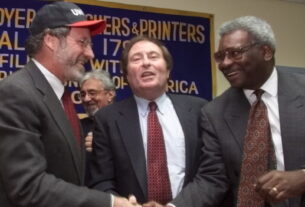Democratic senators on Thursday questioned Steven Bradbury, President Trump’s nominee for deputy secretary of the Transportation Department, about his handling of the congressional investigation into two Boeing Max plane crashes in 2018 and 2019, and his safety record during his previous tenure at the agency.
The Boeing investigation occurred during Mr. Trump’s first administration, when Mr. Bradbury, 66, served as general counsel of the Transportation Department from late 2017 through January 2021. In that role, he oversaw the agency’s legal work and coordinated its legislative efforts and regulatory programs.
The investigative report, written under the direction of Senator Roger Wicker, then the chairman of the Senate commerce committee, states that Mr. Bradbury’s office obstructed the investigation by preventing interviews with Federal Aviation Administration employees who had key information and withholding documents the committee had requested.
Because of interference from Mr. Bradbury’s office, the Senate committee’s investigators were “unable to effectively engage directly with the F.A.A. on document requests or related questions, despite repeated requests and assurances,” the report states.
During the hearing, Senator Maria Cantwell, Democrat of Washington, criticized what she called Mr. Bradbury’s record of “using the law selectively to predetermine” desired outcomes in his time at the department, and during his time at the Justice Department’s Office of the Legal Counsel under President George W. Bush from 2005 to 2009.
“You were responsible for overseeing the department’s regulatory actions and implementing President Trump’s regulatory reform agenda,” Ms. Cantwell said of Mr. Bradbury’s time in the previous Trump administration. “In this role, you orchestrated the rollback of multiple safety requirements under the guise of advancing a reform agenda.”
Mr. Bradbury defended his previous stint at the Transportation Department, saying that at the time of the Boeing investigation his office was overwhelmed by requests for information from Congress and that he was trying to make sure the agency’s responses were complete before responding.
“What we were doing was attempting to facilitate the response to the oversight requests, not impede them, not block them or stonewall the requests,” Mr. Bradbury said.
If confirmed, Mr. Bradbury would help manage the agency’s operations, including the F.A.A.
Mr. Wicker, who still sits on the committee, did not attend the hearing, leaving it unclear whether the Boeing matter would affect his support of Mr. Bradbury.
During the 90-minute hearing, Mr. Bradbury answered questions on a number of topics related to aviation and roadway safety. He signaled his openness to raising the commercial pilot retirement age and expressed hesitancy to mandate certain safety technologies in autonomous vehicles.
Mr. Bradbury emphasized his experience in government, countering criticism of his role in the Boeing investigation and his ties to Project 2025, a conservative policy plan written by the Heritage Foundation, where he currently works. He was cited as a contributor to some of the plan’s sections about transportation.
Members of the Senate committee — both Democrats and Republicans — repeatedly asked whether he would support ending a Transportation Department program known as the Essential Air Service, which subsidizes about 170 small airports across the country that could not afford to operate on their own. Project 2025 states that “ending the program would free hundreds of pilots to serve larger markets with more passengers.”
Mr. Bradbury said that he had not personally written about the Essential Air Service in the report but that he recognized the importance of the program and that the agency should continue to support it.
The Boeing investigation remains a sensitive matter among the families of victims of the Max crashes.
Some of those families sent a letter before the confirmation hearing to Senator Ted Cruz, a Texas Republican and the chairman of the Senate commerce committee, expressing concern about Mr. Bradbury’s nomination.
The letter, written by Javier de Luis, who lost his sister in one of the crashes, and signed by members of five other families, said that “we believe that when it comes to safety, everyone must commit to being transparent and up front, not just with Congress, but with the flying public. We are asking for that commitment from him.”
In addition to the two Boeing 737 Max crashes — Lion Air flight 610 in 2018 and Ethiopian Airlines flight 302 in 2019 — that killed a total of 346 people, a panel blew off the body of a Boeing plane operated by Alaska Airlines last year.
The agency’s current leader, Sean Duffy, has promised to hold Boeing accountable and restore public trust.
A vote on Mr. Bradbury’s nomination has yet to be scheduled.
Kitty Bennett contributed research.





